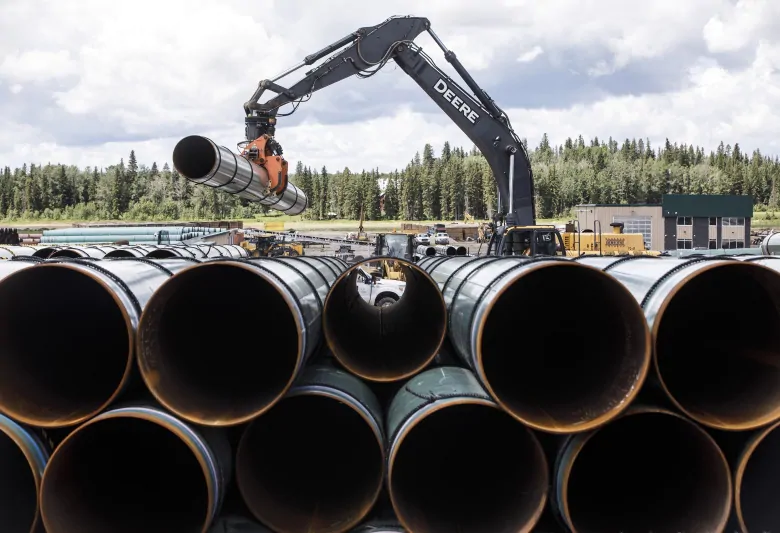B.C. grilled by Supreme Court justices on a bill that would halt Trans Mountain expansion

Supreme Court of Canada justices gave the lawyer representing B.C. a rough ride today as they questioned the constitutionality of a proposed provincial law that effectively would kill the Trans Mountain pipeline expansion project.
The B.C. NDP government has drafted amendments to provincial environmental law to all but ban interprovincial shipments of heavy oil — bitumen and diluted bitumen — and other “hazardous substances” through pipelines, including the Crown-owned Trans Mountain expansion project.
The amendments would require companies transporting these substances through B.C. to first obtain provincial permits.
Joseph Arvay, the lawyer representing the Attorney General of B.C., said Thursday the purpose of the law is to protect the environment by preventing spills, and is not designed to explicitly target the Trans Mountain project.
“The only concern the premier, the attorney general and the members of the government have had is the harm of bitumen. It’s not about pipelines. They’re not anti-pipelines, they’re not anti-Alberta, they’re not anti-oilsands, they’re not anti-oil,” Arvay said.
B.C. Premier John Horgan promised in the 2017 election campaign “to use every tool in our tool box to stop” the construction of the Trans Mountain expansion.
Bitumen is a molasses-like liquid or semi-solid form of petroleum. Environmentalists maintain diluted bitumen is difficult to clean up in the event of a spill on or near water.
Most of the justices — Malcolm Rowe, Rosalie Abella, Russell Brown, Andromache Karakatsanis and Nicholas Kasirer — questioned the province’s authority to enact legislation on a matter that so clearly falls under federal jurisdiction.
Under section 92(10) of the Constitution, interprovincial projects like Trans Mountain are exclusively the purview of the federal government.
That section stipulates that “lines of Steam or other Ships, Railways, Roads, Telegraphs, and other Works and Undertakings connecting the Province with any other or others of the Provinces” are Ottawa’s responsibility.
Rowe said B.C. is trying to block a project legitimately approved by the federal government.
“This [B.C.] legislation is about taking away the ability of the Government of Canada to effectively approve interprovincial pipelines that pass through B.C. carrying anything,” Rowe said.
The Trans Mountain expansion pipeline went through a years-long federal review by the National Energy Board (NEB) and the Canadian Environmental Assessment Agency (CEAA) and has been approved by the federal Liberal cabinet — twice.
Prime Minister Justin Trudeau has said the project, which would carry nearly a million barrels of oil from Alberta’s oilpatch to the B.C. coast each day, is in the national interest.
Trudeau has said the expansion would help deliver Canadian oil to tidewater for shipment to lucrative markets in Asia and reduce price pressures on Alberta oil producers.
“If you have a pipeline and you can’t put anything through it, it’s totally useless. That frustrates the federal permitting process does it not?” Rowe said Thursday.
“Today, it’s heavy oil. Tomorrow, it could be anything else.”
Brown said B.C.’s law “effectively allows the province to regulate the design and operation of an interprovincial operation,” a constitutional no-no given how explicit the document is on interprovincial matters.
Ecojustice lawyer Harry Wruck, an intervener in the case, said environmental concerns should override other constitutional considerations.
“Environmental protection underpins the whole Constitution. Without a viable environment we cannot have a Constitution, we cannot have a nation based on laws, we cannot have institutions, we cannot have a society, in effect,” Wruck said.
“What we’re saying [is] environmental protection is an underlying constitutional principle that must inform the division of power analysis,” he added, citing the constitutional division of federal and provincial jurisdictions.
Last spring, the five judges of the B.C. Court of Appeal ruled unanimously against the Horgan government on similar constitutional grounds.
Jan Brongers, the lawyer representing the Attorney General of Canada, asked the Supreme Court today to dismiss the B.C. appeal because the proposed environmental amendments are ultra vires, or beyond the province’s jurisdiction.
Brongers said the federal government is also concerned about environmental protection and has its own regulations in place to guard against a potential spill. He said B.C. has overreached.
“Your point is the province is reaching into the federal toolbox because their toolbox doesn’t do the job?” Brown asked Brongers.
“Yes. They’re trying to regulate the same subject for the same purpose, but they have different notions for what’s required,” Brongers replied.
Justice Michael Moldaver described the B.C. bill as an attempt to “throw up barriers that will, at a minimum, delay or obstruct” a project approved by the federal cabinet.
Rowe said siding with B.C. in this case would be devastating to interprovincial commerce. “There will be nothing. The uncertainty will kill the business case,” he said.
Brown, Karakatsanis and Rowe questioned the environmental protection argument because the legislation doesn’t address the transport of heavy oils by other means — by ship, for example — or existing heavy oil shipments that move through the province.
Karakatsanis noted that the province already has environmental legislation — the Environmental Management Act — that can be applied in the event of a spill.
Abella said there’s no question a province an enact environmental protection legislation, but the question before the court is whether this legislation protects the environment in a way that interferes with clear constitutional boundaries.
“Can it be done this way, a way that interferes with something that is unquestionably a federal undertaking?” Abella said.
Arvay argued that the division of powers does not amount to “watertight compartments” — and courts previously have recognized that certain functions are best carried out by the level of government closest to the people affected.





